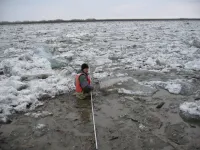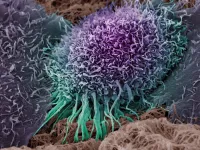(Press-News.org) The cycling of carbon through the environment is an essential part of life on the planet.
Understanding the various sources and reservoirs of carbon is a major focus of Earth science research. Plants and animals use the element for cellular growth. It can be stored in rocks and minerals or in the ocean. Carbon in the form of carbon dioxide can move into the atmosphere, where it contributes to a warming planet.
A new study led by Florida State University researchers found that plants and small organisms in Arctic rivers could be responsible for more than half the particulate organic matter flowing to the Arctic Ocean. That’s a significantly greater proportion than previously estimated, and it has implications for how much carbon gets sequestered in the ocean and how much moves into the atmosphere.
Scientists have long measured the organic matter in rivers to understand how carbon was cycling through watersheds. But this research, published in Proceedings of the National Academy of Sciences, shows that organisms in the Arctic’s major rivers are a crucial contributor to carbon export, accounting for about 40 to 60 percent of the particulate organic matter — tiny bits of decaying organisms — flowing into the ocean.
“When people thought about these major Arctic rivers and many other rivers globally, they tended to think of them as sewers of the land, exporting the waste materials from primary production and decomposition on land” said Rob Spencer, a professor in the Department of Earth, Ocean and Atmospheric Science. “This study highlights that there’s a lot of life in these rivers themselves and that a lot of the organic material that is exported is coming from production in the rivers.”
Scientists study carbon exported via waterways to better understand how the element cycles through the environment. As organic material on land decomposes, it can move into rivers, which in turn drain into the ocean. Some of that carbon supports marine life, and some sinks to the bottom of the ocean, where it is buried in sediments.
The researchers looked at the six major rivers flowing in the Arctic Ocean: The Yukon and Mackenzie in North America, and the Ob’, Yenisey, Lena and Kolyma in Russia. Using data collected over almost a decade, they built models that used the stable and radioactive isotope signatures of carbon and the carbon-to-nitrogen ratios of the particulate organic matter to determine the contribution of possible sources to each river’s chemistry.
Not all particulate organic matter is created equal Carbon from soils that gets washed downstream is more likely to be buried in the ocean than the carbon produced within a river. That carbon is more likely to stay floating in the ocean, be eaten by organisms there and eventually breathed out as carbon dioxide.
“It’s like the difference between a french fry and a stem of broccoli,” said lead author Megan Behnke, a former FSU doctoral student who is now a researcher at the University of Alaska, Southeast. “That broccoli is going to stay in storage in your freezer, but the french fry is much more likely to get eaten.”
That means a small increase in a river’s biomass could be equivalent to a larger increase in organic material coming from the land. If the carbon in that organic matter moves to the atmosphere, it would affect the rate of carbon cycling and associated climate change in the Arctic.
“I always get excited as a scientist or a researcher when we find new things, and this study found something new in the way that these big Arctic rivers work and how they export carbon to the ocean,” Spencer said. “We have to understand the modern carbon cycle if we're really going to begin to understand and predict how it's going to change. This is really relevant for the Arctic at the rate that it's warming and due to the vast carbon stores that it holds.”
The study was an international endeavor involving researchers from ten different institutions.
“That pan-Arctic view of science is more important than ever,” Behnke said. “The changes that are occurring are far bigger than one institution in one country, and we need these longstanding collaborations. That’s critically important to continue.”
Paper co-authors included Suzanne E. Tank, University of Alberta; James W. McClelland, University of Texas; Robert M. Holmes and Anya Suslova, Woodwell Climate Research Center; Negar Haghipour and Timothy I. Eglinton, ETH Zurich; Peter A. Raymond, Yale University; Alexander V. Zhulidov and Tatiana Gurtovaya, South Russia Centre for Preparation and Implementation of International Projects; Nikita Zimov and Sergey Zimov, Russian Academy of Sciences; Edda A. Mutter, Yukon River Inter-Tribal Watershed Council; and Edwin Amos, Western Arctic Research Centre.
This research was supported by the National Science Foundation through grants for the Arctic Great Rivers Observatory.
END
FSU researchers find decaying biomass in Arctic rivers fuels more carbon export than previously thought
2023-03-13
ELSE PRESS RELEASES FROM THIS DATE:
Statins may reduce heart disease in people with sleep apnea
2023-03-13
NEW YORK, NY (March 13, 2023)--A new study by Columbia University researchers suggests that cholesterol-lowering drugs called statins have the potential to reduce heart disease in people with obstructive sleep apnea regardless of the use of CPAP machines during the night.
CPAP (continuous positive airway pressure) therapy improves sleep quality and reduces daytime fatigue in people with obstructive sleep apnea. But based on findings from several recent clinical trials, CPAP does not improve heart health as physicians originally hoped.
Alternative ...
New process could capture carbon dioxide equivalent to forest the size of Germany
2023-03-13
New research suggests that around 0.5% of global carbon emissions could be captured during the normal crushing process of rocks commonly used in construction, by crushing them in CO2 gas.
The paper ‘Mechanochemical processing of silicate rocks to trap CO2’ published in Nature Sustainability says that almost no additional energy would be required to trap the CO2. 0.5% of global emissions would be the equivalent to planting a forest of mature trees the size of Germany.
The materials and construction industry ...
City or country living? Research reveals psychological differences
2023-03-13
Living in the country, in rural areas, has long been idealized as a pristine place to raise a family. After all, open air and room to run free pose distinct advantages. But new findings from a University of Houston psychology study indicate that Americans who live in more rural areas tend to be more anxious and depressed, as well as less open-minded and more neurotic. The study also revealed those living in the country were not more satisfied with their lives nor did they have more purpose, or meaning in life, than people who lived in urban areas.
The ...
A potential new target for head and neck cancer immunotherapy
2023-03-13
Researchers at University of California San Diego School of Medicine and Moores Cancer Center at UC San Diego Health have identified a strong association between the product of a gene expressed in most cancers, including the most common type of head and neck cancer, and elevated levels of white blood cells that produce antibodies within tumors.
The findings, published in the March 10, 2023 issue of PNAS Nexus, suggest a potential new target and approach for cancer immunotherapies that have thus far produced mixed results for certain head and ...
Impact of Covid-19 pandemic on incidence of long-term conditions in Wales
2023-03-13
A population data linkage study using anonymised primary and secondary care health records in Swansea University’s SAIL Databank has revealed that in 2020 and 2021, fewer people in Wales were being diagnosed with long-term conditions than expected.
Diagnosis rates increased over the two-year period but for most conditions, they still lagged behind expectations at the end of 2021 implicating a potential backlog of undiagnosed patients who are unlikely to be receiving systematic monitoring and management for their conditions.
The study was led by researchers ...
Risk of death for people with dementia increases after a hurricane exposure
2023-03-13
Previous studies of hurricanes have shown general increases in mortality but little has been known about how mortality following hurricane exposure may differ among older adults living with dementia.
Their increased risk could be due to disruption of normal routine, such as access to caregiving, changes in living environment, loss in access to medications, and change in daily routines, said study first author Sue Anne Bell, assistant professor at the U-M School of Nursing.
The analysis focused on risk for mortality among people ...
Cherenkov color imaging shows promise in enhancing radiation therapy effectiveness
2023-03-13
Cherenkov imaging is a valuable cancer treatment tool that can help doctors track and monitor radiation doses received by tissues during cancer therapy in real time. This imaging technique works by detecting Cherenkov radiation, which is emitted by tissues exposed to high-energy radiation, such as X-rays or electron beams from a linear accelerator. As high-energy charged particles from the incident radiation pass through biological tissue, either as primary or secondary radiation, they interact with the electromagnetic fields of the atoms and molecules in the tissue. These soft collision-type interactions ...
Abnormal biomarkers associated with obesity are identified in very young Latino children, study finds
2023-03-13
In the United States, low-income, Latino youth are disproportionately affected by obesity with 25.8% of Latino youth aged 2-19 considered to have obesity, which is approximately two times more likely when compared to their non-Latino white counterparts. A higher level of obesity results in an increased risk of cardiometabolic diseases, which are a group of related diseases caused by an unhealthy lifestyle and/or an increased genetic predisposition.
A new study by Allison McKay, RDN, department manager for the Department of Nutrition and Food Studies, identified elevated insulin, hemoglobin A1C, triglycerides, and other cardiometabolic ...
People should have right to shape marine environmental decisions
2023-03-13
Government and political institutions should do more to make citizens feel empowered within marine environment decisions and give them the right to participate, new research shows.
Marine Citizenship is the term used for people who get involved in changing how humans use the ocean. It has been investigated as a potential policy tool to engage the public in marine environmental issues through a new study by the University of Exeter and the University of Bristol Law School.
Despite efforts to tackle human causes such as overfishing, marine litter, microplastics, pollution, ocean acidity, global warming and climate change, there ...
New targets for CAR-T cell therapy against acute myeloid leukemia through AI-assisted analysis
2023-03-13
Unlike other forms of blood cancer, acute myeloid leukemia (AML) cannot currently be treated with CAR-T cell immunotherapy. The reason is that specific molecular targets with which certain immune cells could specifically target AML cells are lacking, which would permit the immune system to attack cancer. Two research teams of Professor Dr. Sebastian Kobold with Dr. Adrian Gottschlich from the Division of Clinical Pharmacology at LMU University Hospital Munich and Dr. Carsten Marr with Moritz Thomas from the Institute of AI for Health at Helmholtz Munich have now ...




